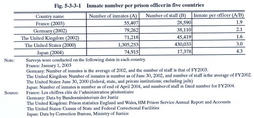| Previous Next Index Image Index Year Selection | |
|
|
1. Countermeasures taken for prison overcrowding (1) Increasing accommodation capacity by building more facilities At present,Japan's prisons are the most overcrowded in the last30or40years,accommodating more than60,000inmates in total,with the occupancy rate of capacity for convicted prisoners constantly exceeding100%.Overcrowding has caused noticeable problems regarding(1)inmates'living environment,(2)management of prisons,and(3)provision of appropriate correctional treatment.From all the viewpoints,the problem of overcrowding needs to be resolved.Prisons have taken measures for easing overcrowding such as providing double bunk beds,remodeling classrooms and other facilities into accommodating cells etc.,but all these are stopgap measures.Accommodation capacity needs to be increased significantly by constructing new facilities or rebuilding present facilities.
The Ministry of Justice has taken budgetary measures to increase accommodation capacity by4,000persons in the FY2001 budget(initial and supplementary budgets),by3,700persons in FY2002 budget(initial and supplementary budgets),by4,100persons in FY2003 budget(initial and supplementary budgets),and by1,500persons in FY2004 budget(initial budget),and the accommodation capacity for convicted prisoners and defendants awaiting trial will reach about78,000at the end of FY2004.The Ministry is preparing to establish a new prison(Center for Promotion of Reintegration into Society)based on the Private Finance Initiative(PFI)method.However,since there is a possibility of a further increase in imprisoned person,efforts to increase accommodation capacity need to be continued.Prisons newly established based on the PFI method are described later. (2) Review and enhancement of human resources In recent years,inmates presenting various treatment challenges have increased,as has the overall number of inmates,which places a heavier burden on prison staff.This means that the working environment of staff has deteriorated,and at the same time,effective treatment of inmates may be adversely affected.
Unlike in Western countries,where safety officers and treatment officers are deployed separately,each prison officer in Japan covers both safety and treatment work.Each officer deployed in a factory or prison cell counsels the inmates in his charge on their troubles and worries,provides them with living guidance or other treatment for their correction and social rehabilitation,and at the same time,works to prevent offenses or accidents by giving consideration to the individual characteristics etc.of each inmate.Under such a system,where prison officers cover both treatment and safety,the heavier burden caused by overcrowding may deprive them of their composure,and may result in deterioration of the correctional treatment level. Fig. 5-3-3-1 shows the inmate number per prison officer in five countries:France,Germany,the United Kingdom(limited to England and Wales),the United States and Japan.It is obtained by dividing the number of inmates by the number of staff(including all staff in safety work,treatment work,and medical work).Prison systems vary by country,and it is not necessarily appropriate to simply compare the inmate number per officer of different countries.However,it may serve as a reference. Fig. 5-3-3-1 Inmate number per prison officer in five countries Fig. 5-3-3-2 shows the maximum number of prisoners under the charge of one prison factory officer in63prisons and juvenile prisons excluding medical prisons and detention houses.As of end of May2004,the maximum number of prisoners per officer was80or more in13prisons,90or more in five prisons,and the highest was123(Source:Data by Correction Bureau,Ministry of Justice).Fig. 5-3-3-2 Maximum number of prisoners under charge of one prison factory officer(As of May31,2004) In the light of this situation,not only an improvement of facilities for increasing accommodation capacity but also enhancement of human resources is inevitable to ease prison overcrowding.For that purpose,securing an adequate number of prison officers,introducing private sector vitality(private consignment of general affairs,PFI method,part-time workers etc.),and streamlining and laborsaving are considered.The Ministry of Justice plans to improve and enhance the human structure of prisons by appropriately combining these measures based on professionalism and continuity of duties,economic conditions,and the social situation,etc.Column Assigned Officer System The"assigned personnel system"is an indispensable part of the correction system in Japan.Uniformed prison officers cover both treatment and safety of inmates,unlike in prisons in Western countries.Of course,staff who had studied sociology,psychology,or pedagogy etc.provides professional guidance to inmates,but the major feature is that prison officers become directly involved in inmates'everyday lives and provide daily guidance for them.An officer who is assigned to a fixed factory unit and cells,called the"assigned officer,"counsels the inmates in his charge on their troubles and worries,provides them with various kinds of treatment for their correction and social rehabilitation,and at the same time,works to prevent offenses or accidents by giving consideration to the individual characteristics etc.of each inmate. In this way,staff officers become involved in the overall work for inmates,which often results in mutual trust between officers and inmates.Inmates are often cooperative,and officers do not need to threaten them by weapons such as guns to maintain discipline.Although prison officers do not carry any weapons,there have been no uprisings or disturbances since1969in Japanese prisons,and other accidents such as escapes have occurred much more rarely than in other countries.It is thought that this is because the assigned officer system has worked well. On the other hand,there is criticism that the officers in this system have too much discretion.Furthermore,some say that the current system imposes too much burden on individual officers and is unreasonable in the situation that they sometimes take charge of80to90inmates in overcrowded environments,as mentioned in the main text.Therefore,the Recommendation of the Council for Prison Administration Reform states that"the basic framework of the assigned officer system should be maintained with its advantages,but authority and responsibility should not be concentrated too much on individual assigned officers."It also recommends that the support system by mental health officers etc.should be strengthened for those assigned officers who take charge of many difficult inmates who do not adapt to group treatment and tend to cause trouble with others.Based on the recommendation,the Correction Bureau of the Ministry of Justice has been continuing trials such as support by psyc hologist staff of those officers in charge of factories and prison cells in Fuchu Prison. |

